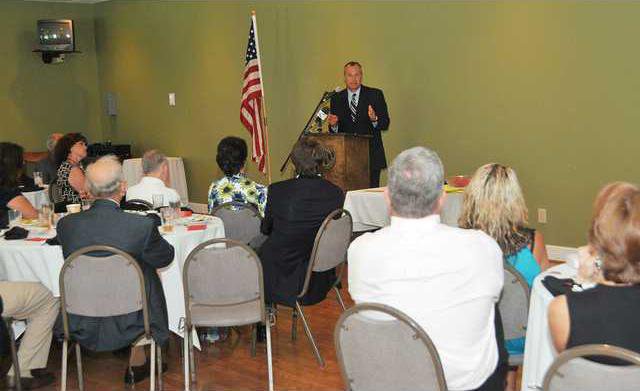Lt. Gov. Casey Cagle urged local leaders Tuesday not to let the future of a county-owned reservoir be jeopardized by political squabbles.
Cagle, who spoke at a Kiwanis meeting in Gainesville, called plans for Glades Reservoir “critical” to the region’s future water needs following last year’s federal ruling that could severely limit metro-Atlanta’s use of Lake Lanier.
“That is not only critical for this county, but it is critical for the entire region,” Cagle said. “ ...I will tell you that we don’t need to make it political. It doesn’t need to be a fight between a city and a county. It needs to be a desire to do what is fundamentally right for the future of this state.”
In July 2009, U.S. District Court Judge Paul Magnuson ruled that the region’s use of Lake Lanier as a source of drinking water was never federally authorized. Magnuson gave Georgia three years to come to an agreement with Florida and Alabama over how the water in the Chattahoochee should be used, have Congress change the lake’s authorization or cut its use of the lake back to 50-year-old levels.
“It has created a lot of challenges for all of us,” Cagle said of Magnuson’s nearly year-old ruling.
Since the ruling, Cagle said the state’s leadership has tried negotiating with Florida and Alabama and made steps toward conserving water in the region.
“Politically, that’s a little difficult right now, because of the players, the governors right now, that either are not running for re-election or are running for a different post,” Cagle said. “But we are still optimistic that we can reach an agreement with these other states and we think that science is on our side.”
But the future of the region’s water supply, Cagle said, would hinge upon building more reservoirs. After his speech, Cagle said he had not seen any scientific proof that conservation alone would meet the region’s water demands.
“We have to build more reservoirs,” Cagle said.
Cagle noted a months-long disagreement between Gainesville and Hall County officials over the future of Cedar Creek Reservoir, a city-owned reservoir that county officials would like to use to pass water from the future Glades Reservoir.
Hall officials have said they need Cedar Creek Reservoir so they can sell water to other governments and help pay for the construction of Glades Reservoir as part of a system linked to Cedar Creek.
Gainesville owns Cedar Creek Reservoir, but Hall County, which built the reservoir and later deeded it to the city, still holds the permit needed to withdraw the water.
County officials have said they aren’t willing to hand over the permit unless the city is willing to give the county ownership of the reservoir. In recent weeks, city and county officials have said they intend to negotiate, with county officials promising to draw up a business plan for the construction of Glades.
Cagle would not comment specifically on the details of the city-county disagreement Tuesday. Instead he left his comments focused on the need for resolution.
“We’ve just got to get it done; we’ve got to get the reservoir done,” said Cagle. “We want to see a resolve to this issue. ... I personally believe that if there is a hold-up then we need to put those differences behind (us) and think about what’s in the best interest of the county and the city as a whole, along with the region, too.”
Cagle also spoke Tuesday about the state’s budget and the need to find funding to build more roads to retain industry in Georgia.
“Georgia doesn’t create jobs, what we do is create the right circumstances, the right environment by which those jobs can be created,” Cagle said.
He also spoke about the recent closing of Jones Elementary School, calling it an “efficiency model” to save administrative and infrastructure costs.
“If this was a business, the business would do it, obviously, without blinking an eye,” Cagle said. “... I happened to went to Jones Elementary and played ball there and everything, and so I love the school and I hate to see it close. But the truth is in difficult times like this, you have to make those choices.”
Asked by a member of the audience to comment on the state’s gubernatorial race — in which fellow Hall Countian and former U.S. Rep. Nathan Deal is involved — Cagle demurred.
“Put it this way: I don’t know who’s going to be the next governor, but I know who the next lieutenant governor is going to be,” Cagle said.
Cagle faces no opposition in the July 20 Republican primary. Democrats Carol Porter and Tricia Carpenter McCracken are vying for the nomination to face him on the fall ballot.

